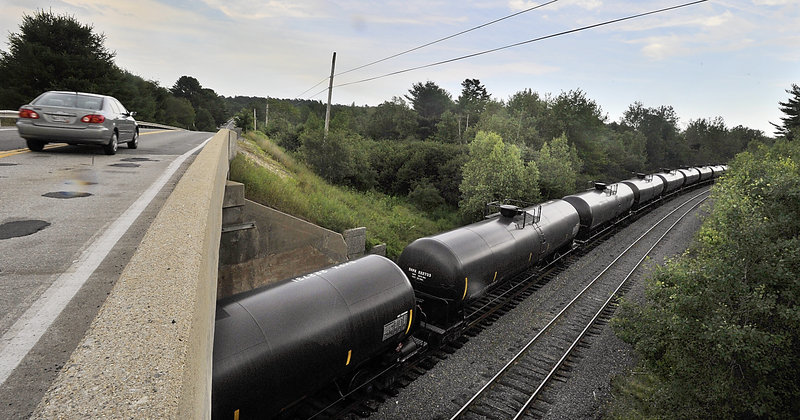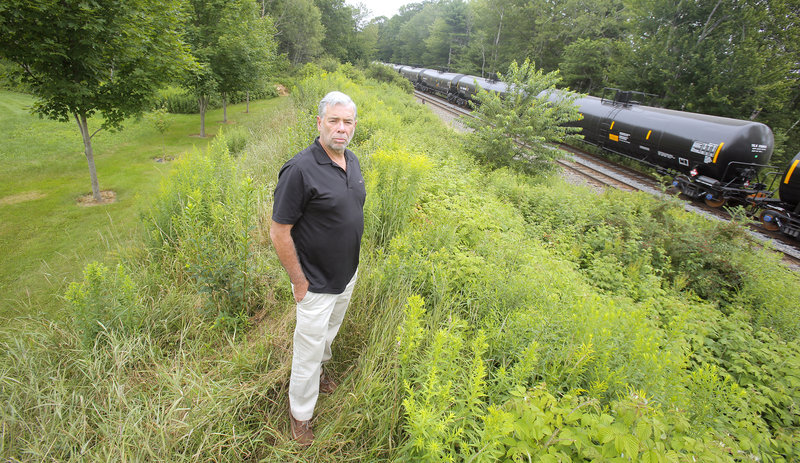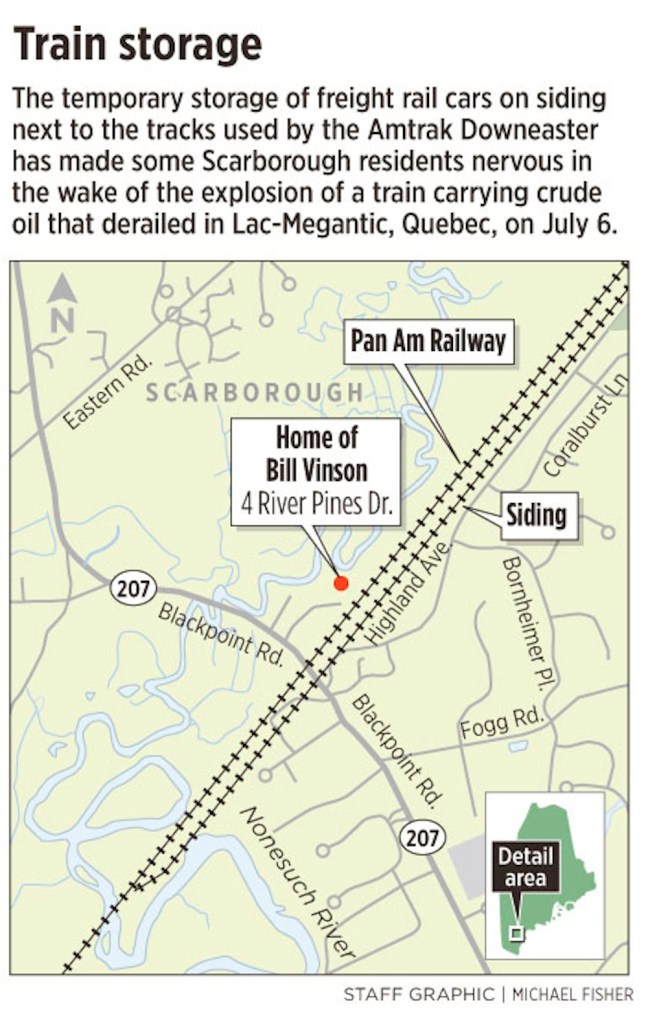SCARBOROUGH – A long line of parked freight and tanker cars stretched along the railroad siding behind Bill Vinson’s home on River Pines Drive this week.
“Quite frankly, this is a disaster waiting to happen,” Vinson said.
As freight and passenger rail traffic increased in recent years, residents of the area around Black Point Road and Highland Avenue complained about rumbling trains and loud whistles, which the Amtrak Downeaster must sound each time it passes the parked freight cars.
Now, however, some residents say the recent train derailment in Lac-Megantic, Quebec, has them wondering how safe it is to store freight and tanker cars — some carrying propane, oil or natural gas — near densely populated neighborhoods and within feet of passing passenger trains. The July 6 derailment and explosion of a runaway train carrying crude oil is believed to have killed 47 people in the small town 10 miles from the Maine border.
Railroad and state officials say the practice of storing freight cars on sidings such as the one in Scarborough is routine in the business, and safe. And first responders regularly drill and prepare to deal with train emergencies, according to the Scarborough fire chief and others.
In two other local communities where freight trains are routinely parked — Yarmouth and South Portland — municipal officials say they have heard no safety concerns from residents since the Quebec accident, and that they are also prepared for emergencies.
“We are an established oil port and rail yard here in South Portland, so that has already been thought through,” said South Portland City Manager James Gailey.
Lillian Neavers lives off West Main Street near Yarmouth’s railroad junction, but said she doesn’t worry.
“I’ve been here since 1981 and I’ve always had the heavy trains coming by,” Neavers said. “I know it’s a scary thing, especially what happened in Canada, but I’m not worried at all.”
Anthony DiPhillipo, who lives in the Thornton Heights neighborhood near Rigby Yard in South Portland, also said he wasn’t overly concerned because of what happened in Quebec.
“That seemed like kind of a fluke accident,” he said. “I figure fuel is transported on trucks on the highway, too, and those are probably prone to just as many if not more accidents as trains.”
A Pan Am Railways tanker car derailed at the Rigby Yard on March 2 because of a broken link between trains. The car damaged five other cars, some of which were carrying liquid propane gas, but none of the contents spilled, according to the Federal Railroad Administration report on the accident.
When told Tuesday about that derailment, DiPhillipo revised his earlier opinion.
“Yeah, that makes me feel not settled,” he said. “I got two young kids, and what if they went out playing and some kind of horrible environmental thing is happening and no one knows about it? It’s scary.”
In Scarborough, a recent increase in train traffic had made some neighbors sensitive to the nearby rail line before the accident occurred in Quebec.
Dianne Farr-Brady, who lives on Roundabout Drive, said she wasn’t concerned about living next to a railroad track when she moved in 12 years ago, but the addition of the siding seemed to bring more loud freight traffic that rattles her house and reminds her how close they are.
“Some of the trains, once they hit the marsh, they’re just cruising,” she said. “Before (the derailment in) Canada, I thought to myself, ‘If one of these derails, we’re the first house.’ I’m thinking about it even more now. It’s nerve-wracking.”
Vinson, who has lived on River Pines Drive for 21 years, is the closest neighbor to the siding, built several years ago by Pan Am Railways. The siding allows freight trains to pull out of the way of other trains, including the Amtrak Downeaster passenger train, which passes through the area as many as 12 times a day. Vinson said the siding is within 100 feet of 25 homes and within an eighth of a mile of more than 100 other houses.
“Unfortunately, it’s kind of evolved into (Pan Am) using the siding as a parking lot for trains that are coming or going from the Rigby rail yard in South Portland,” Vinson said.
The freight cars carry a variety of dry and liquid cargo, including crude oil and other petroleum products.
Town Manager Tom Hall said he hears more complaints about train whistles than about the risk of accidents, but he recognizes why some residents are concerned about the practice of storing cars on the siding.
“I think what’s maddening to the residents is there’s a full Rigby Yard four or five miles down the track. There may be a more appropriate place for them to store their cars,” he said.
Railroad and state officials say the practice of temporarily storing cars on sidings is both common and safe.
Neither the state nor local municipalities have oversight of the tracks, which are regulated by federal authorities. The tracks are inspected regularly by federal officials and at least weekly by Pan Am Railways, according to a company official.
Nate Moulton, director of the industrial rail access program for the state Department of Transportation, has met with Scarborough residents and town officials to discuss concerns about the siding near Highland Avenue and to act as a liaison to the railway company. “If cars are left there for storage, that’s common on any siding,” Moulton said.
Cynthia Scarano, executive vice president of Pan Am Railways, said the rail company avoids storing train cars on the siding for more than a day or two at a time, and that the trains are secured and not left idling. “We’ve tried to alleviate as much nuisance as we can,” she said.
Scarborough officials, meanwhile, say they are prepared to respond to train-related emergencies, although there have been no incidents in recent memory.
Fire Chief Michael Thurlow said his department regularly trains for railroad emergencies so first responders can become more familiar with trains and related equipment. Scarborough also is part of the Presumpscot Valley Haz-Mat Team, along with Gorham, Westbrook, Standish, Windham and Gray.
“We all have hazardous materials in our community and we all have transportation routes we need to deal with,” Thurlow said, noting the derailment in Canada has “everybody’s awareness piqued” about the potential for a tragic train accident. “These types of incidents are very rare and we hope to never deal with one locally.”
Gillian Graham can be contacted at 791-6315 or at:
ggraham@mainetoday.com
Karen Atonacci can be contacted at 791-6377 or at:
kantonacci@mainetoday.com
Send questions/comments to the editors.






Comments are no longer available on this story